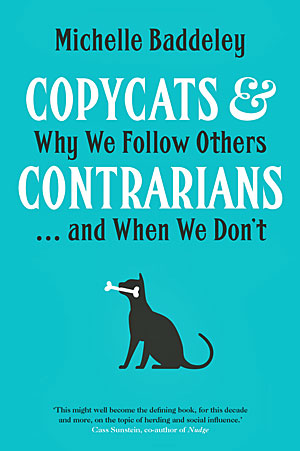
Copycats and Contrarians takes on the idea, promulgated by some economists, that humans are selfish and independently-minded creatures, who use complex mathematical rules to solve problems. This book argues that we are also social animals, and our instincts to follow, herd, and copy others are deeply ingrained.
So, is herding mindless and stupid? When we suspect that people around us know more than we do, then following them is common sense. We may join long restaurant queues but avoid empty restaurants. Social media reviews may help us to choose our holidays. Policy-makers, who release social information about others’ choices, may encourage us to be more responsible about everything from energy consumption to organ donation.
But imitation is also the product of ancient impulses and instincts. It evolved in our ancestors, enabling them to survive harsh natural environments. When food and resources were scarce and threats were ever-present, our ancestors followed others around them because they might have had better information about where to find food or water. Or, as part of a group, they would find safety from predators and environmental threats. Over the course of human history, however, civilizations have grown, technologies have become ever more sophisticated, and our herding tendencies now seem more maladaptive than effective survival strategies.
Copycats and Contrarians explores how, today, we face a delicate, fragile balance of individual, group, and social interests. In the modern world, following others sometimes works well. But other times it generates perversions. The Internet has given mob-leaders a power to manipulate crowds that is unrivalled in human history. The political tensions around the UK’s vote to leave the EU and the US election of Donald Trump have both been driven by rapid shifts in herd opinions. These shifts are catalyzed by online gossip, twitter trolls, and false news that speed along globalized social media channels. In computerized financial markets, too, herding develops quickly and precipitates large and destabilizing speculative bubbles, including flash crashes on futures and currency exchanges.
Copycats and Contrarians explores our instincts to follow others from a uniquely multidisciplinary perspective. It draws on insights and evidence from economics, finance, psychology, neuroscience, evolutionary biology, and behavioral ecology. In explaining our herding propensities, the book suggests that our copying behaviors reflect complex interplays of cognition and reason with instinct and emotion.
The analysis in Copycats and Contrarians draws on some of my early thinking about herding and imitation, which I developed as a PhD student in Cambridge, UK, in the 1990s. There I looked closely at the British economist John Maynard Keynes’s writings, including his 1936 book, The General Theory of Employment, Interest and Money. In his work, Keynes explored how and why conventions, social learning, and other social influences drive financial speculation, business investment, and entrepreneurship. One of his key insights, picked up in modern microeconomic theories of herding, and consistent with insights from behavioral ecology, is that herding is about social learning. We copy others when we don’t know what to do ourselves. We assume that others around us know more than we do, and so it makes sense for us to follow them. The problem for macroeconomists, however, is that it is difficult, if not impossible, to pull together robust empirical evidence about what drives the behavior of individuals within the economy.
So, from around 2004, I began exploring models of herding developed in microeconomics, in addition to models from macroeconomics with which I was already familiar, alongside insights from behavioral economics, social psychology, and neuroscience. I worked with some Cambridge neuroscientists, and devised with them some behavioral and brain imaging experiments to gather some evidence about how likely people are to copy others, and what is going on in their brains when they do.
This focus on biological sciences also led me into some of the related literatures, including evolutionary biology. My herding research had attracted some interest from other behavioral scientists, including behavioral ecologists, with whom I had the opportunity to learn more about herding and social learning, not only among humans, but also in the animal kingdom.
Copycats and Contrarians has some chapters that will appeal to economists and experimental scientists, others that will appeal more to those interested in sociology, social psychology, and politics. The chapter on “Mavericks” stands out because mavericks have been neglected in the research literature; there has been much more analysis, at least in economic theory, of the copycats than the contrarians in our world.
For original scientific research, the chapter “Herding on the Brain” is the most interesting. Here I present some of my seminal research with Cambridge neuroscientists, including Professor Wolfram Schultz and his group, that explored some of the neural correlates of herding behavior. Wolfram Schultz is one of the pioneers in neuroeconomics – a relatively new subfield of economics which brings together economic insights with neuroscientific analysis. We used brain imaging techniques – specifically functional magnetic resonance imaging – to monitor our experimental participants’ neural responses while engaged in a stock-picking task.
For this experiment, our participants were given two pieces of information. First, some non-social information about a financial stock was presented in the form of a stock performance chart. Second, some social information about what other people had decided to do was also given to participants. Essentially, our participants were being asked either to stick with their own judgements based on the financial information that we’d given them, or, alternatively, to copy others’ decisions.
We found that most people, around 70%, copied others; this result is consistent with other experimental studies. The brain scans were more surprising; they showed some complex interplays of neural response. Copying others was associated with activations in areas of the brain usually associated with emotional processing. Copying others was also associated with activations in areas of the brain usually associated with higher level analytical reasoning.
From these experiments, it seems that herding reflects a complex interplay of reason and emotion. These findings connect with new insights into dual systems thinking, i.e. System 1 (emotional, automatic) versus System 2 (cognitive, deliberative), popularised by Nobel Prize-winning economic psychologist Daniel Kahneman in his 2011 book Thinking, Fast and Slow.
To capture the overall point of the book, the final chapter argues that social media and online social networks have perverted our instincts to follow others. Social information and social feedback travel rapidly and in large volumes via our online social networks. Added to this, the anonymity of online interactions means that people do not have to take the same responsibility that they have to take when interacting in more traditional contexts.
The pre-online equivalents of Twitter trolls and cyber-bullies, for example, may have had the inclination to persecute others but the channels for their anti-social behaviors were limited, and the chances of being detected and suffering social sanctions were larger. More benignly, memes can circulate and multiply online in ways that would have been unimaginable even 20 years ago.
Online, we tend to gather in echo chambers; most of us are selective about who we follow online and we tend to follow those who share our opinions. In these echo chambers, herds of voters quickly reinforce each other’s social opinions and partisan political positions. So herds’ opinions are magnified much more quickly than in the past, tipping over into impactful, real-world choices– for example, voting patterns. We may dismiss online opinion as ephemeral and diffuse but when it generates herds of people reinforcing specific political and social positions, and if these online herd opinions change people’s behavior, there will be wide-reaching consequences.
One solution would be to institutionalise mechanisms to preserve contrarian opinion – for example by protecting mavericks and contrarians, including whistle-blowers, from vilification and ostracism. Given that humans are inclined to be copycats most of the time, our world urgently needs more contrarians to ensure that wrong-headed conventional wisdoms cannot persist for too long.


Michelle Baddeley is Director and Research Professor, Institute for Choice, University of South Australia, and Honorary Professor, Institute for Global Prosperity, University College London. She has a BA in Psychology, BEcon from the University of Queensland, and MPhil/PhD in Economics from the University of Cambridge. She is President-Elect, Society for the Advancement of Behavioral Economics and Editor-in-Chief, Journal of Behavioral Economics for Policy. In her research, Michelle uses insights and methods from applied economics, behavioral economics and finance, and neuroeconomics to explore policy-relevant topics across a range of domains including financial decision-making, employment, housing, cybersecurity, and energy.